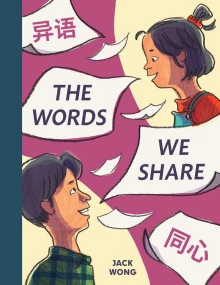
The Words We Share
Written and illustrated by Jack Wong
Annick Press, 2023, 32 pp (unpaged)
ISBN: 9781773217970
This portrayal of a child who serves as a language broker for an immigrant parent is a tender story of the love between a father and daughter and how language can be a tool that both separates and unites. Angie and her father are Cantonese-speaking immigrants from China who recently arrived in Canada. Angie uses her English skills from school to aid her father in navigating situations, such as reading menus in restaurants and making signs for the office building where he works as a janitor. Her experiences inspire her to start a new business—creating English signs for the Chinese-speaking business owners in their neighborhood. She makes a deal to create a sandwich board for a local café and a warning sign for customers who fail to pick up their shoes at a repair shop. Everything is going well until Mr. Chu complains about Angie's signs describing how to use the machines in his laundromat, leading to a situation where her father uses his language skills in Hakka to resolve the situation. His bilingual linguistic ability in Cantonese and Hakka surprises Angie and strengthens their bond. They are both bilingual but in different languages, all of which have usefulness in navigating life in their community. Angie and her father hold the mantle of language for each other in an expression of love.
Cartoon-style illustrations that integrate bilingual dialogues bring the story to life, particularly in conveying the loving relationship between Angie and her father. The illustrations were created by making swatches of texture and color with acrylic paint or printmaking ink rolled on paper, as well as line drawings in pencil or crayon. All of these were scanned and digitally collaged in Photoshop. The dialogues in the illustrations provide a multilingual experience through the use of simplified Chinese characters and italicized English translations.
A note from the author points out that Hakka and Cantonese are different varieties or dialects of the family of languages called Chinese. The two varieties in this book are from Southern China and Southeast Asia. He also notes that speakers of varieties of Chinese read and write using the same written Chinese characters, even though they are pronounced differently based on the dialect. Chinese characters are therefore not used for Hakka, since they would appear the same as Cantonese. Instead, the language is described by Angie as "musical sounds" she does not understand. The cover has a title in Chinese characters as well as in English. Wong explains that his mother translated the English title, The Words We Share, into Cantonese to say something close in meaning to "The Same Heart in Different Languages."
Previous books about children as language brokers, such as Pepita Talks Twice/Pepita habla dos veces (Ofelia Dumas Lachman, 1995) focus on translation into English as a burden for bilingual children. This book instead portrays multilingualism as a strength and as occurring across multiple languages, instead of focusing only on English as the status language. Other examples of books highlighting multilingualism include My Mother's Tongues by Uma Menon and Rahele Jomepour Bell (2024), highlighting Malayalam and English, The Day Saida Arrived by Susan Gómez Redondo and Sonja Wimmer (2020), highlighting Arabic and English, and Spanish is the Language of My Family by Michael Genhart and John Parra (2023).
The warmth of the father-daughter relationship in this book radiates out to readers so pair this with other books depicting this relationship. Possible pairings include the classic Owl Moon by Jane Yolen and John Schoenherr (1987), My Papi Has a Motorcycle by Isable Quintero and Zeke Peña (2019), and Days with Dad by Nari Hong (2017). Each of these books focus on a daughter sharing a special walk or ride around the neighborhood with a father and reflect different cultures. Jack Wong says that, for him, this book is really about the love between a parent and child, before it's about language or immigration.
Jack Wong is an author/illustrator who was born in Hong Kong and raised in Vancouver. He currently lives in Nova Scotia. In an interview with Andrea Wang, he says that many of the scenes in this book were inspired by his own childhood experiences in moving from Hong Kong to Canada and translating for his parents. He compared childhood memories with his older sister in writing this book, particularly around Angie's feelings of pride, frustration, and being wronged about having major responsibilities at a young age. His sister is an ESL assessment coordinator and wrote the educator's guide for the book.
Jack Wong's debut picturebook, When You Can Swim (2023), won multiple awards, including the 2023 Boston Globe-Horn Book Award and the 2023 Governor General's Literary Award in Young People's Literature. He has a new book being released in March 2024, All That Grows. Jack describes himself as a Jack-of-all-trades who has tried his hand at bookkeeping, teaching art, managing a psychology research lab, and running his own bicycle repair shop. He says that he seeks to share his winding journey with young readers so that they can embrace the unique amalgams of experiences that make up their own lives.
Kathy G. Short, University of Arizona
© 2023 by Kathy G. Short
Authors retain copyright over the vignettes published in this journal and grant the journal right of first publication with the work simultaneously licensed under the following Creative Commons License:
WOW Review, Volume XVI, Issue 1 by Worlds of Words is licensed under a Creative Commons Attribution-NonCommercial-ShareAlike 4.0 International License. Based on work by Kathy G. Short at https://wowlit.org/on-line-publications/review/xvi-1/10.
WOW review: reading across cultures
ISSN 2577-0527









